Francis Wilbur Le Page: Market Gardener and Councillor
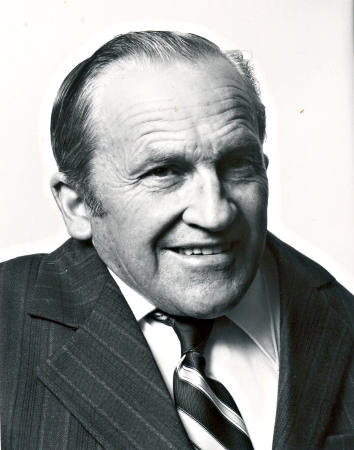
Francis Wilbur Le Page OAM , 1989. Courtesy Leader Collection.
Frank and his future wife, Valma Town, shared an interest in the Cheltenham Football Club. Frank was a member of the club committee and Valma was on the social committee. The Cheltenham Football Club, along with local cricket and tennis clubs, was a major focus for many members of a community that was emerging from a dominance of rural activities; market gardens, poultry farms and sand pits. In addition to membership of the club committee Frank served as timekeeper for the juniors for several years.
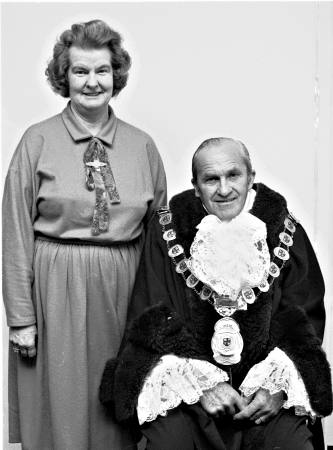
Mayor and Mayoress of Moorabbin, Frank and Valma Le Page. Courtesy Leader Collection.
On March 31, 1951 Frank and Valma were married at the Cheltenham Church of Christ with a wedding reception following in the Mechanics’ Hall. Frank was placed on the Cradle Roll of the church when he was born, and later attended kindergarten and Sunday school where he was awarded a medal for ten years of unbroken attendance. As an adult he became chairman of the Church Board for two years. It was in the new Church of Christ, on the opposite corner to the building in which he was married, that the service held after his death to celebrate his life was conducted.
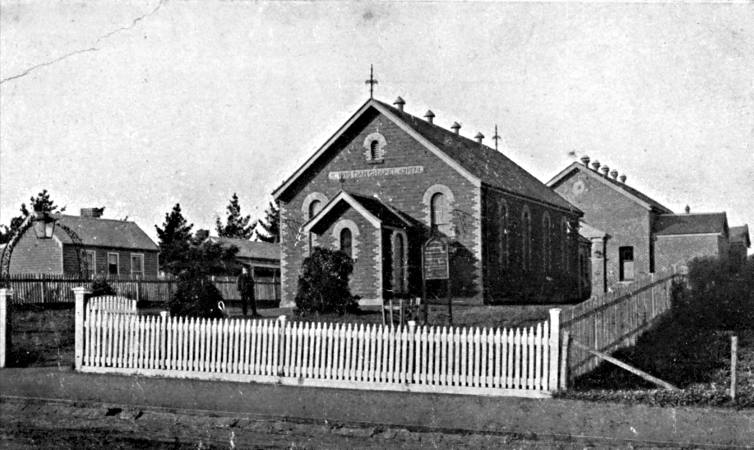
Cheltenham Church of Christ, c1920. Courtesy David Reynolds, Kingston Collection.
Frank was born at home at 60 Wilson Street, Cheltenham on 31 January, 1919, the second son of Everest and Lynda Le Page in a family of six children. He attended Cheltenham State School where he completed his Merit Certificate in grade eight before studying bookkeeping, shorthand and typing at Bradshaw and Everett Business College in South Melbourne. Recalling his days at Cheltenham school he said ‘I walked a mile each way to school. It was a good school with a big area of ground but we were not allowed to go up the hill at the back. Now and again at lunch time we would go into the park and chase possums. I was probably only watching. They were pretty wild and would scratch.’ [Whitehead, G., Interview with Frank Le Page] After leaving the business college he undertook various jobs in the city before convincing his father to let him work with him in the family’s market garden.
Both Frank’s grandfather and father were active in local government. Francis Thomas Le Page was a councillor for 25 years and served a term as shire president in 1902. Everest, his son, was a councillor for the City of Moorabbin for 28 years and was mayor on two occasions. Consequently it was not surprising when the opportunity arose that Francis Wilbur took up the challenge of council membership. Frank explained the circumstances that led to his becoming a councillor. ‘I attended meetings of the Cheltenham Dispensary Board on behalf of my dad. He couldn’t be there because he was at council meetings. It was the dispensary board who asked me to represent them on the Cheltenham Chamber of Commerce. The chamber elected me president and with the resignation of Doug Clarke in 1964 from the Moorabbin Council, asked me to stand for the vacancy. I did and was successful. I was a member of the council for 28 years and mayor on three occasions. I retired from Council in 1989.’ On 19 April 1974 Frank took up another role which had previously been performed by his father and grandfather. He became a member of the Cheltenham Cemetery Trust.
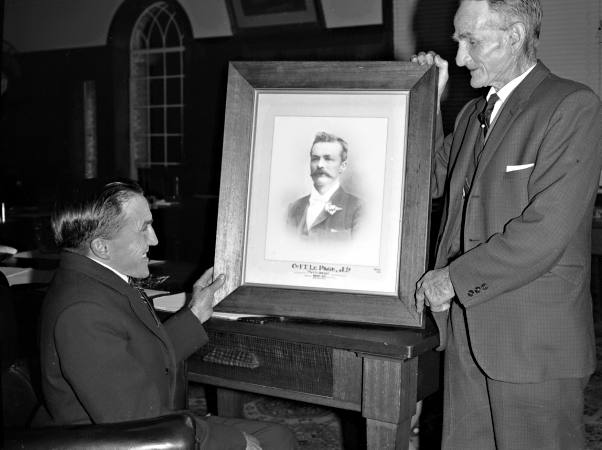
Cr Frank Le Page with his father Everest Albert Le Page looking at a portrait of Francis Thomas Le Page. Courtesy Leader Collection.
During the mayoral periods Frank and Valma were frequently featured in the Moorabbin News, the local paper, as they attended numerous public functions. Frank led the council deputations to government departments, was a Commissioner of the Melbourne and Metropolitan Board of Works and a council member of several local schools. He was president of the Cheltenham Park Flora and Fauna Committee. For his contribution to Rotary he was made a Seventy-fifth Anniversary Paul Harris Fellow in 1992 and awarded the Order of Australia Medal on 9 June, 1986 for service to community and to local government. The new library, opened at Cheltenham on 6 July 1986, was named the Frank Le Page Library in recognition of Frank’s contributions as a councillor and resident in the municipality of Moorabbin.
Frank died on 14 July 2008 and a service to celebrate his life was held at the Cheltenham Church of Christ. At the well attended service the following eulogy was delivered by Frank’s nephew, Rob Le Page:
‘I’d like to share with you some light hearted experiences that, as a child, and later on as an adult working with Uncle Frank for many years, come to mind.
Frank Le Page was born at home in Wilson Street Cheltenham the second son of Lynda and Everest. Theo the eldest was already two being born in 1917. There would be six more significant changes to the Le Page household in the next nine years. Uncle Vern was born in 1920, Auntie Dorothy in 1922, Auntie Jean in 1923, town water was connected to the house in 1925, electricity in 1926 and my father Len was born in 1928.
Uncle Frank went to Cheltenham State School until age 14. After leaving school he would walk each day from home in Wilson Street to Cheltenham station to catch a train to Flinders Street and then walk to Bradshaw & Everetts Business School in City Road, South Melbourne, where he studied shorthand and typing. When the course finished he worked at the Fishermens’ Co Op in King Street Melbourne and stayed there until late 1937 when a new career opportunity would open for him.
He had been encouraged by his mother and father to pursue a clerical role because they considered his physical condition to be unsuitable for life as a vegetable grower, but as we all know him, in his own distinct stubborn way he would later prove them wrong.
In 1937 Puppa (Everest Le Page) contracted a paralysis in his right hand and lost the use of some of his fingers. Uncle Frank seized the opportunity to convince his father that he should come home and work in the family business due to his father’s ailment. His younger brother, Uncle Vern, had already started his working life as a vegetable grower in 1934 after leaving school at 14. My father Len would later join his father and two brothers after leaving school at age 13 in 1941.
Uncle Frank must have been convincing because in early 1938 he started his working life over again in the family business where he would remain in a unique partnership with his two younger brothers.
In 1958 Puppa handed the business over to the boys and they remained partners until Uncle Frank and Uncle Vern retired in 1978. They would, however, still be seen down the paddock for many years to come after that.
That is the background to Uncle Frank’s childhood and working life but there is plenty more that can be said:
The Kitchen Table
I was born in 1955. Uncle Frank was already 36 and for the first 21 years of my life I lived in the same house that the Le Page family grew up in so I witnessed first hand what had been a tradition and would continue on for many years.
The family business was conducted from there and all discussions relating to absolutely anything, whether it be politics, religion, family or business matters, were carried on around the wooden kitchen table during meal times.
On rare occasions the tension and volume would rise but there was always an umpire in the room. Muma was the first, then Mum and after they bought the Centre Dandenong Road property, Auntie Joan would share this burden.
Auntie Valma was mostly saved from this chore but on many hot summer evenings the three wives, children in tow, would be used as slave spud pickers to finish off the load for market. At those times she would see first hand what went on day in and day out.
Sometime the umpires would be the only calming influence in the heat of the discussion but I can’t remember any discussion ever flowing on for more than the remainder of the day. It usually extinguished long before the next visit to the table which in some instances would only be two hours.
The Le Pages had their own unique way of handling the English language. Morning tea was lunch, lunch was dinner and afternoon tea was again lunch. Each of these would be spent around the kitchen table and sometimes could go on longer than expected depending on the level of conversation. Uncle Frank was always a more than willing participant and like his father he would always have the last say.
The Bike
During my childhood I remember Uncle Frank using a push bike on a daily basis to get to and from work.
Rain, hail or shine he would arrive every morning, ride home and back at dinner time (remember dinner in Le Page language is lunch to most other people) and go home every night on the same bike. I am still not sure exactly why he rode a bike. We could ask, was it to keep fit, was it his contribution to conserve the world’s energy resources for future generations, or was it merely to save money. We will never know, but I suspect the last reason.
Very occasionally he would drive if he had a meeting to go to but mostly it was the bike with the bulls-horn handle bars, that today sits in the shed at Dad’s place, that would get him to or from work each day.
I don’t ever remember him having any accidents and to be sure he would tuck his pants in with his two silver spring clips that he carried in his pocket all day and off he would go.
His Cats
His last job every day on his way home was to feed the cats at the shed at Grandma’s. Grandma’s as it was known was the original family home, sheds and stables on the corner of Wilson Street and Bernard Street.
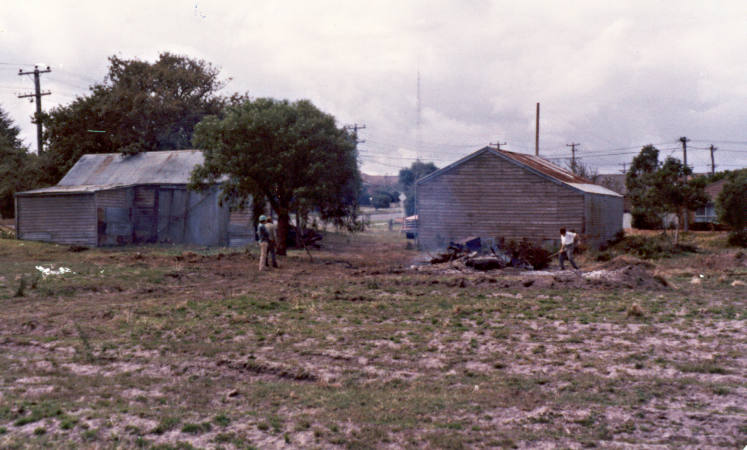
Sheds on Le Page property, corner of Bernard and Wilson streets, c1976. Courtesy Len Le Page, Kingston Collection.
Before he left 90 Wilson Street each night Uncle Frank would come inside, cut a slab of meat from what Mum had bought, wrap it up in newspaper and off he would go on his bike.
The cats knew he would be there every night and waited patiently. He would arrive, meat in hand and call out ‘Puss’ ‘Puss’ ‘Puss’ and the cats would come out of wherever they had been asleep for the day. This ritual occurred seven days a week. He loved his cats.
The Market Man
Puppa was the market man and as the boys reached an age where they could drive they all took a turn at travelling to the Queen Victoria market and in later years the Footscray Market to sell the produce.
Dad did the marketing from 1946 until he gave it up for health reasons in 1966. Uncle Frank took over and continued until about 1974 when I took over.
Sometimes the trips to market would be twice a week, sometimes only once a week. Frank would get out of bed at 2.00 a.m., ride his bike without lights to 90 Wilson Street, and take the truck loaded with vegetables off to market. He would usually get home between 8.30 and 9.00, ride his bike home, have a sleep for a couple of hours, and return later in the day, again on his bike.
During school holidays I would go to market with him on every occasion I could. The highlight of the trip was, once the last of the produce had been sold and picked up, he would take me for breakfast in the market café. The bacon and egg sandwich and chocolate malted milk was always my preferred option. Uncle Frank would have tea with his.
On many occasions Rhonda would come along and if we weren’t asleep in the cabin of the truck we would be helping where we could or walking around seeing the sights and what happens at these early morning starts. Uncle Frank was always willing to share his unique way of selling and getting optimum price.
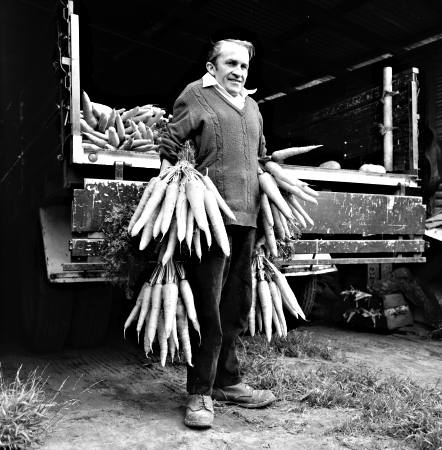
Frank Le Page loading carrots on to truck for market, 1972. Courtesy Leader Collection.
The Gambler
I suspect that very few of you knew he was a betting man.
As a child I barracked for Collingwood and Uncle Frank barracked for St Kilda. We had a standing deal that when our teams played the bet was on.
Most people here would remember the small packets of four pellets of chewing gum that were around in those days.
The standard bet was that the loser would buy the winner a packet of choice, whether it be Juicy fruit or PK. I don’t think that he ever bought a Tatts ticket in his life but he enjoyed our traditional bet.
For years and years on a Saturday afternoon we would be in the shed washing carrots and parsnips and the radio would be going with the footy on.
Uncle Frank has been known on occasion to stop the carrot washer to hear a goal being scored hoping that St Kilda was going to win to save the threepence for the chewing gum. Neither of us ever welched on a bet.
Traditions
Family members who worked in the paddock had their own roles. Puppa was the spud cutter, Uncle Vern was the tractor driver, Dad was finance and organisation and Uncle Frank was the flower and seed man.
For many years we grew carnations and every year we would take slips off the flowers that were picked to get the next year’s plants.
Uncle Frank was fastidious about how, when and where the slips would be planted out. He would then look after them until they were ready for planting out the next season.
He was also the parsnip seed man and would take great pride in his selection of stock to be transplanted to get the seed for next year. He would select the type of parsnip that he considered was the best and would get cranky if you put one aside for his selection and it wasn’t good enough. It would be rejected immediately without even him uttering a word. But the look he would give said it all.
His expertise and tools of the trade for sowing cabbage seed were second to none. He had an old sardine tin that was used to hold the seed and this was one of the few times I ever remember him wearing his glasses at work, although he probably should have more often.
He would prepare the ground, then use a special angled wooden drill rake to get the exact depth required, then he would sow the tiny cabbage seed with military precision being careful not to get it too thick or too thin. He always said spindly cabbage plants were no good.
Onion seed was another of his specialities. Seed would be grown and then to be able to re-sow the seed it had to be cleaned by hand.
The wooden instruments used for this process would only come out once a year and I can remember coming home from school and there would be Uncle Frank and Puppa in the shed with the tools of trade ensuring that the seed was cleaned properly. The smell of the cleaning process is a memory that I will never forget.
He was a perfectionist.
The Wheel Man
We have all heard the saying the ‘wheel man’ that’s used in racing car circles, well Uncle Frank was the lever man on the blood and bone and lime spreader for most of his working life. He had a special coat that I suspect had been part of a suit he had worn in the early 40s and was only used on several occasions each year.
The special coat hung in various places in the sheds over the years and was always given a shake and the spiders removed before he put it on. He also had a special hessian bag that he used as a cushion that was stored in the spreader. It didn’t matter which paddock we were spreading wherever the spreader went the coat and bag were always close by.
He was somewhat like Joffa the famous Collingwood cheer squad member with his gold jacket that only comes out when Collingwood wins. So I am pretty sure he stole this idea from Uncle Frank.
The New Car
Uncle Frank’s first car was a 1930 A Model Ford which he drove until 1959.
I remember in December 1959 going with Dad, Puppa and Uncle Frank to Mentone Motors in Balcombe Road Mentone where they bought two new FC Holden’s, HBX276 and HBX277.
Uncle Frank drove his car until 1973 when he bought a new HQ Holden, again from Mentone Motors, which were then on Nepean Highway at Cheltenham.
Uncle Frank was not renowned for his driving expertise, not because he had any accidents. It was probably more the speed that he was capable of travelling at that scared most occupants.
This would be noticeable to most observers because for many years Auntie Valma sat in the back seat.
For years we would travel back to Wilson Street from the paddock in Centre Dandenong Road for dinner. Sometimes Puppa would drive and that was a scary experience in itself but sometimes Uncle Frank would drive.
At times the car would be roaring in second gear at 35 miles an hour and someone would say Frankie there is another gear in the gearbox if you want to use it. A grunt could be heard and third gear would be selected. Sometimes , not a word was said but we always made it safely.
Uncle Frank was usually the tractor driver for us when we were picking up vegetables down the paddock and taking them back to the shed.
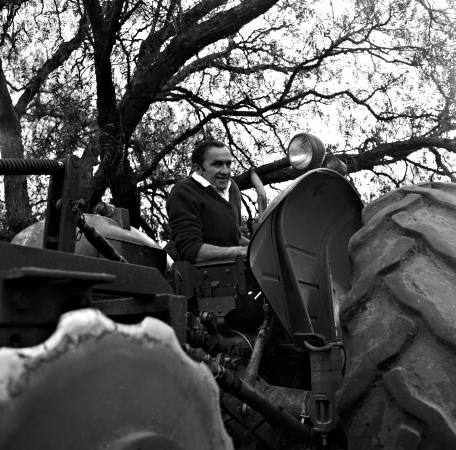
Frank Le Page at the wheel of the tractor, 1972. Courtesy Leader Collection.
As the years went on his movement and reflexes deteriorated and his backing ability was to say the least, suspect. When backing into the shed with the trailer behind the tractor to unload we would have to guide him all the way and the words ‘left or right hand down Frankie’ were used to get the trailer somewhere near where it was wanted.
It was only a few weeks ago when the same situation came up when my brother Neil and I were working at Dad’s trimming some trees for him. Neil (who’s second name is Francis) was in the ute not really concentrating and I was standing in the back with a saw. The plan was that Neil would back into the tree so I could reach the branches. A situation arose where we were not heading where we needed to go and those same instinctive words left my mouth, ‘Left hand down Frankie’.
Neither Neil nor Dad could see for some time because of the tears of laughter streaming down their faces as it brought back some fond memories of Uncle Frank’s time as our tractor driver.
Loading Manure
As kids we were exposed to lots of things that normal kids would think appalling and one of them was horse manure. We used lots and it all had to be loaded by hand onto the truck with forks which meant that you stood up to your knees in the pit of horse manure and worked up a sweat.
As a kid I would sit on either Dad’s, Uncle Frank’s or Uncle Vern’s knee in the cramped cabin of the 1946 Ford truck during the trip. I used to love going every Friday morning to Ashburton dairy to get the manure and when the loading was finished Uncle Frank used to take me into the stables with Bob the stableman and we would admire the horses. I think he missed the old days when one horse power was all there was.
Much later on when horse manure was becoming hard to get we started going to the dairy in Cheltenham and then to the dairy in Wickham Road, Highett. The first time we went to Highett Uncle Frank, Uncle Vern and I did the trip. We got there and found a very small hole in the wall of a large pit to get the manure out. The idea was that you crawled through the hole and threw the manure out onto the truck. Uncle Frank made the decision that two in the pit and one on the truck seemed like the way to do this job, so in I went with Uncle Frank behind me, and Uncle Vern on the back of the truck. It was all quiet in the pit and once the first few forkfuls had been removed the steam got so thick that you couldn’t see. With Uncle Frank’s eyesight not the best thoughts of a fork in the leg came to mind, but I didn’t have to wait long before my fears were over. The first few minutes were okay until there was a lot of squealing coming from the pit and Uncle Vern yelled out, ‘Has someone been stabbed.’ There was no answer but I have never seen anyone move as quick as Uncle Frank did that morning. The pit was full of rats and with each fork full of manure we were stabbing them. It brings to mind the old saying ‘like a rat up a drain pipe,’ because that’s how fast he was out of the pit. He never went again.
The Washing Machine
We all had our roles and Uncle Frank’s was to load the washer so that carrots, parsnips and spuds could be washed for market. Even with his physical condition he was still as able bodied as anyone else and did his job which would be timed to the precise second by his wrist watch with different washing times for each variety. Minute and a half for parsnips and two minutes for carrots.
He controlled the door opening on the washer to allow the vegetables to be let out to sort and count back into cases. The whole operation was as precise as a Swiss watch.
There were the times when we had an electric washing machine but when I was a kid the produce was either washed in bags in a trough or in a hand-turned barrel, forty turns for carrots and twenty five for parsnips. This was hard work and if you accidentally let go of the handle you quickly stepped back so you didn’t get flung into next week. Well one day Uncle Frank’s Swiss watch was obviously losing time and he let go of the handle at the wrong time and it came around and hit him on the arm. It hurt his pride more than anything, but he never let go again.
Horses
Up until 1946 when the first tractor arrived, horses were used to cultivate.
Uncle Vern had Billy, Uncle Frank had Jimmy and Dad had Micky. Jimmy and Micky survived until about 1959 but during their last years all they did was eat grass and get fat.
The brothers loved their horses and looked after them until their death just as they had done for many many years. It was a sight to see Uncle Frank leading these huge horses down the track to the cow paddock each morning and back again at night.
The Trips to Rosebud
In 1984 we bought the farm at Rosebud and over the next eight years Uncle Frank would visit many times.
During the first few years he would travel down with us and help with washing spuds. During the hot afternoons we would all get under the shade of the pine trees and sort the small spuds what had been rejected from washing.
By this stage of his life his eyesight was not as good as it had been and a constant eye had to be kept on what went in the case that would later be sold in market. Every now and then the words ‘If it was any greener it would be grass’ were heard, to indict to him that what he had just put in was no good. He wouldn’t say a word. He would just pick the green spud back out and continue on like nothing had happened.
In the 90s he would travel down on his own just for a visit. He would usually arrive about eleven o’clock and then head for home after lunch. (That’s afternoon tea in case you have forgotten!) At twelve or thereabouts we would head inside for dinner and we would always offer him a feed but instead he would wander in with his basket on his arm with his lunch that Auntie Valma had packed for him. He always said he didn’t want to be any bother and he never was.
A Good Bloke
I hope that this has given an insight into the Uncle Frank that I grew up with, the same one we all knew and loved.
To me as a kid growing up and later as an adult he was special and an all round good bloke. I am sure to all his nephews and nieces he was a cherished uncle and role model who at most times only saw things as black or white, but on occasions made us laugh.
The last thing I want to say is that every night before Uncle Frank got on his bike to go home he would come and say goodbye to everyone at 90 Wilson Street. When Puppa was alive his response to Uncle Frank every night was always ‘Hooray Winky’ So in Puppa’s tradition and for the last time ‘Hooray Winky’
